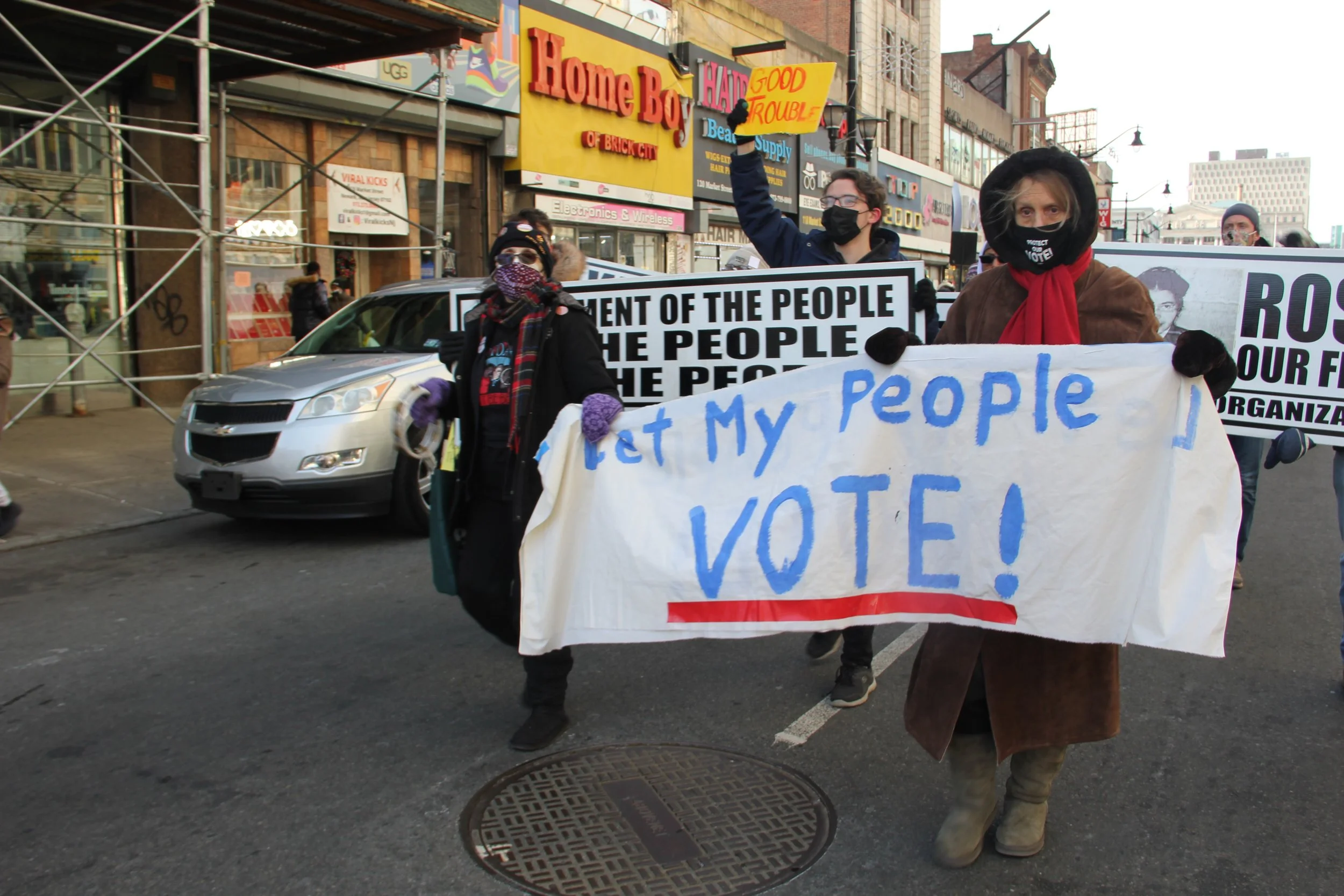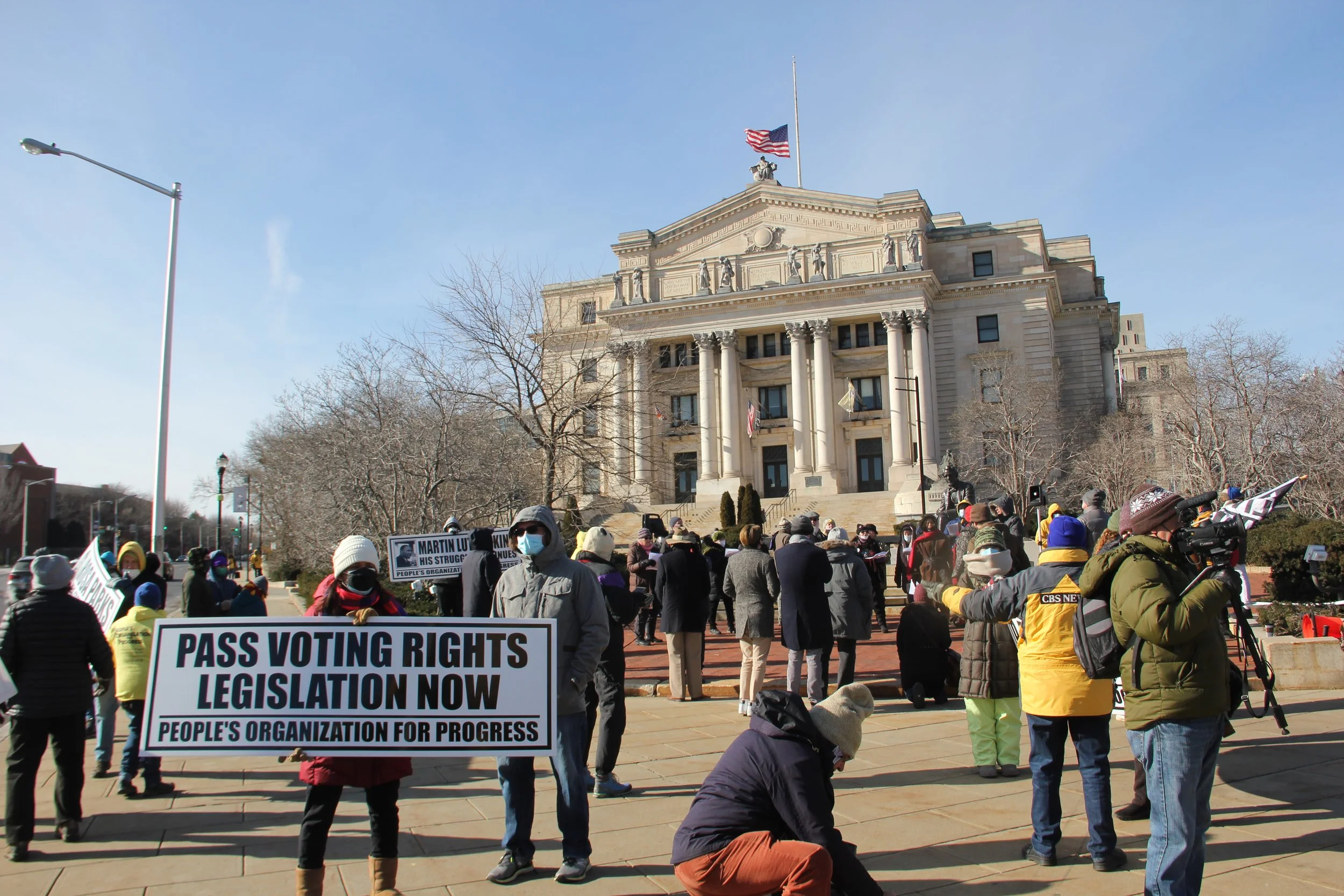The fight for voting rights continues…
Marchers holding their banners as they walk up Washington Street for the ‘MLK march for voting rights,’ Jan. 15, 2022. (Josie Gonsalves for Public Square Amplified)
NEWARK, NJ—Fifty-seven years ago Martin Luther King's campaign for voting rights began, and his work still resonates in communities across this country - a new century but an old fight that is yet to be settled.
Last weekend, in freezing temperatures here in New Jersey, members of the People's Organization for Progress (POP), elected officials and many Newark area residents, gathered for the annual Martin Luther King, Jr. march to remember and affirm the struggle for racial justice, with an acute lens on voting rights, and issue that was at the forefront of King’s activism.
"We are here on the coldest day of the year not to talk about how bad things are but to talk about what we are going to do to make it better. We're here not to commiserate, but we're here today to ask for justice and to call on the institutions that run this society to change their racist and oppressive ways," said Lawrence Hamm, chairman of POP, to set the stage for the march.
Congressman Don Payne, Dahlia Vertreese, mayor of Hillside, Dean Davis, mayor of Maplewood, and Deborah Gregory Smith, president of the National Association for the Advancement of Colored People (NAACP), Newark, were all participants as well.
Braving the bitter and bone-chilling cold, people in attendance clung to banners inscribed with statements such as "Protect our Voting Rights," "Let my people Vote," and "Stop fascism." Their voices rang down Springfield Ave, across onto Market and Broad Streets, ending at the feet of the Martin Luther King, Jr. statue on Martin Luther King, Jr. Boulevard afront the Essex County Courthouse.
"What do we want? Voting rights! When do we want it? Now!" they chanted.
Larry Hamm, founder and chairman of POP, led the crowd down the unpaved road on the way to that "more perfect union"--with a megaphone in hand and proudly wearing his yellow hoodie with POP printed in bold letters. Hamm made it clear about their demands: the passage of the Freedom to Vote Act, the John Lewis Voting Rights Advancement Act, the For the People Act, the return of civics education to public schools, and the abolition of the electoral college. Although these issues were at the forefront of the rally, they also issued demands on social and economic issues such as police brutality, reparations, minimum wage increase, and the preservation of labor unions.
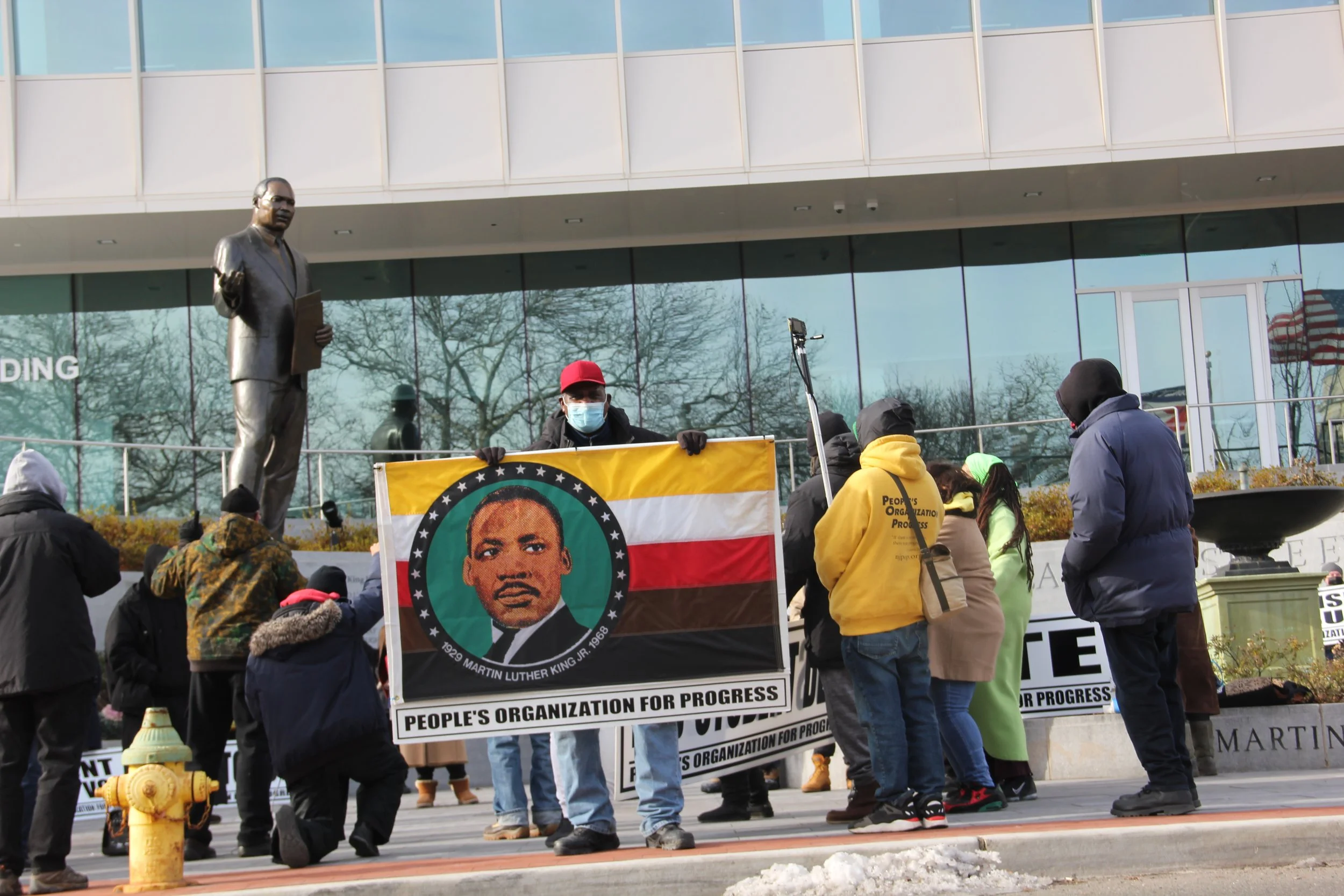
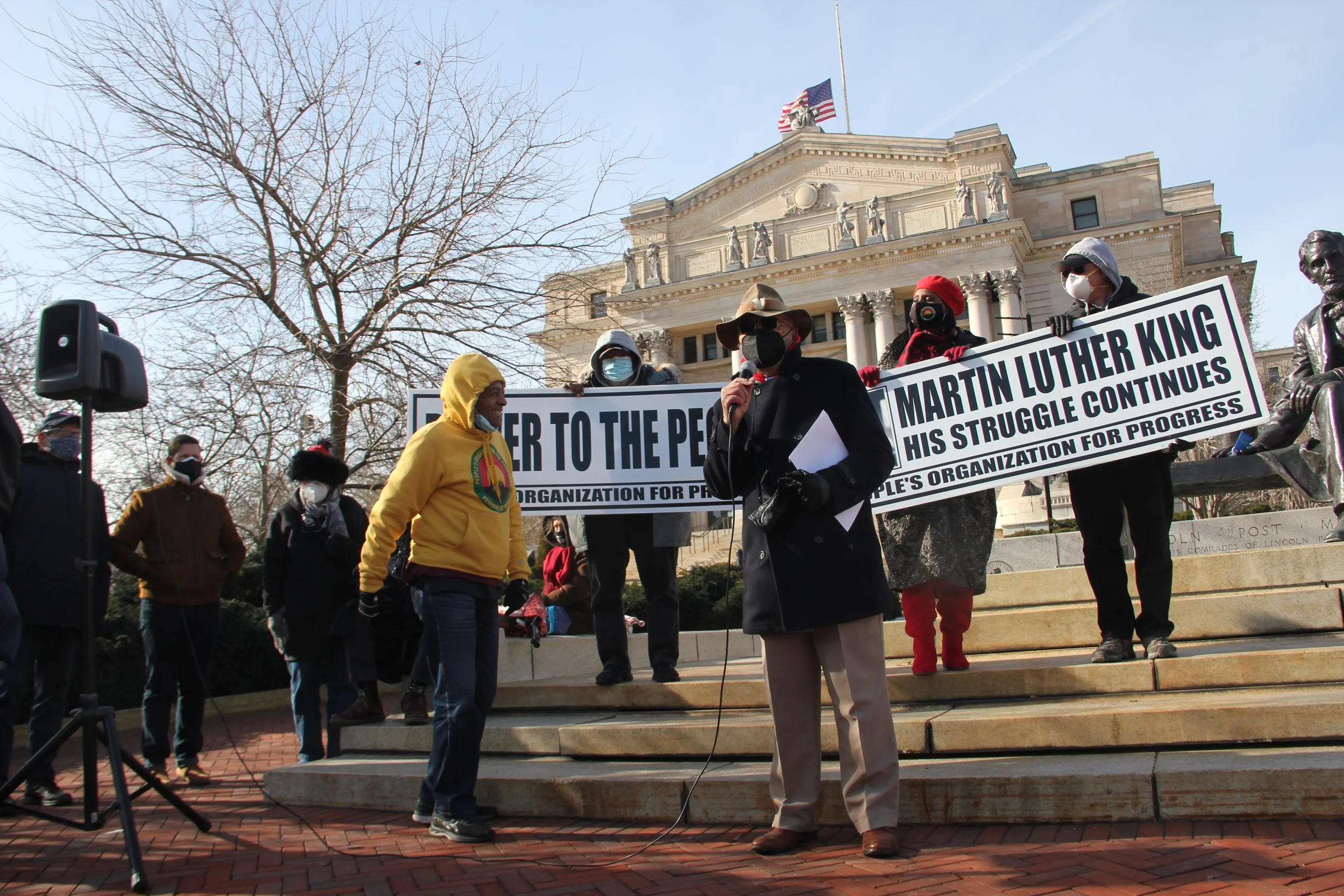

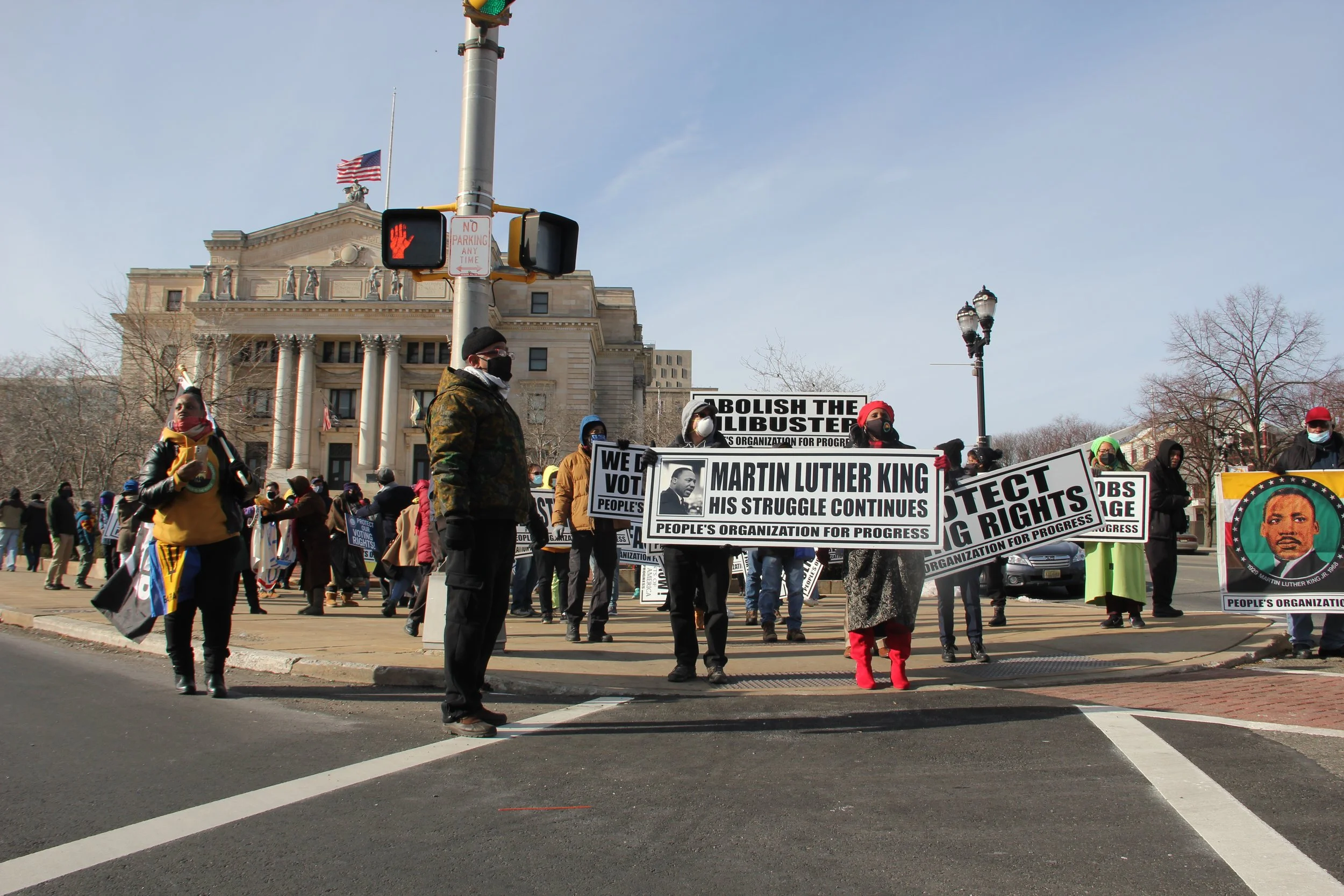
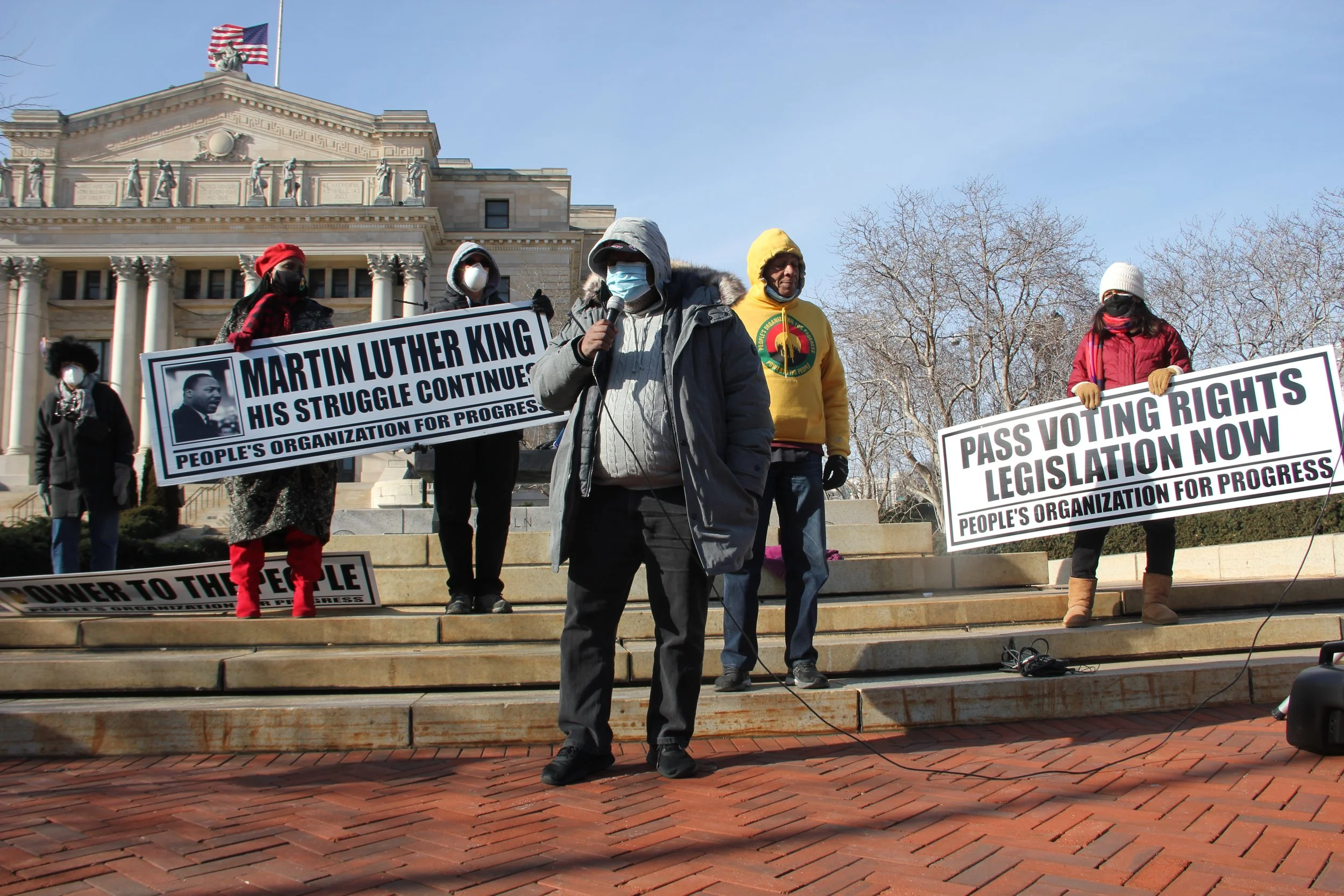
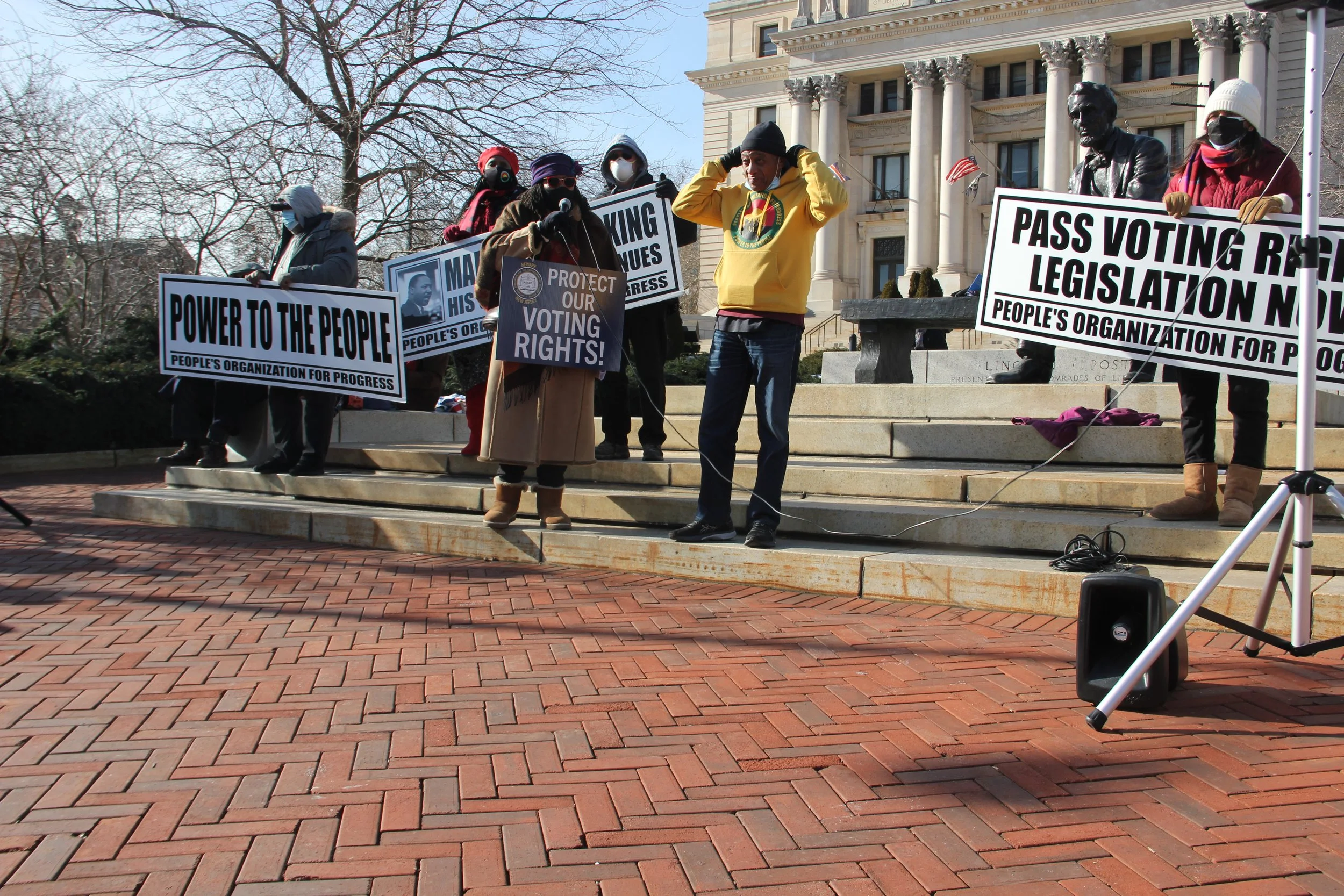
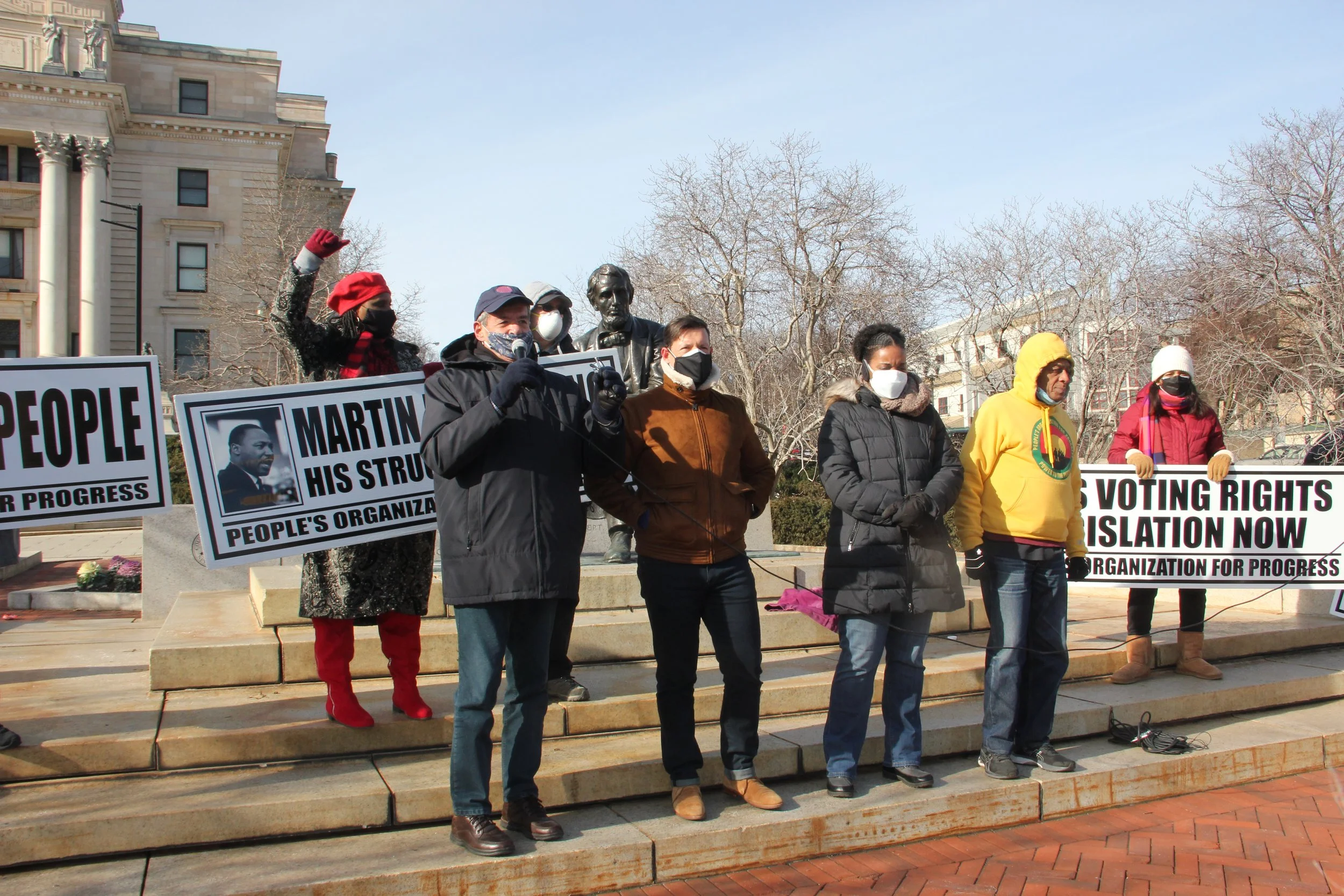
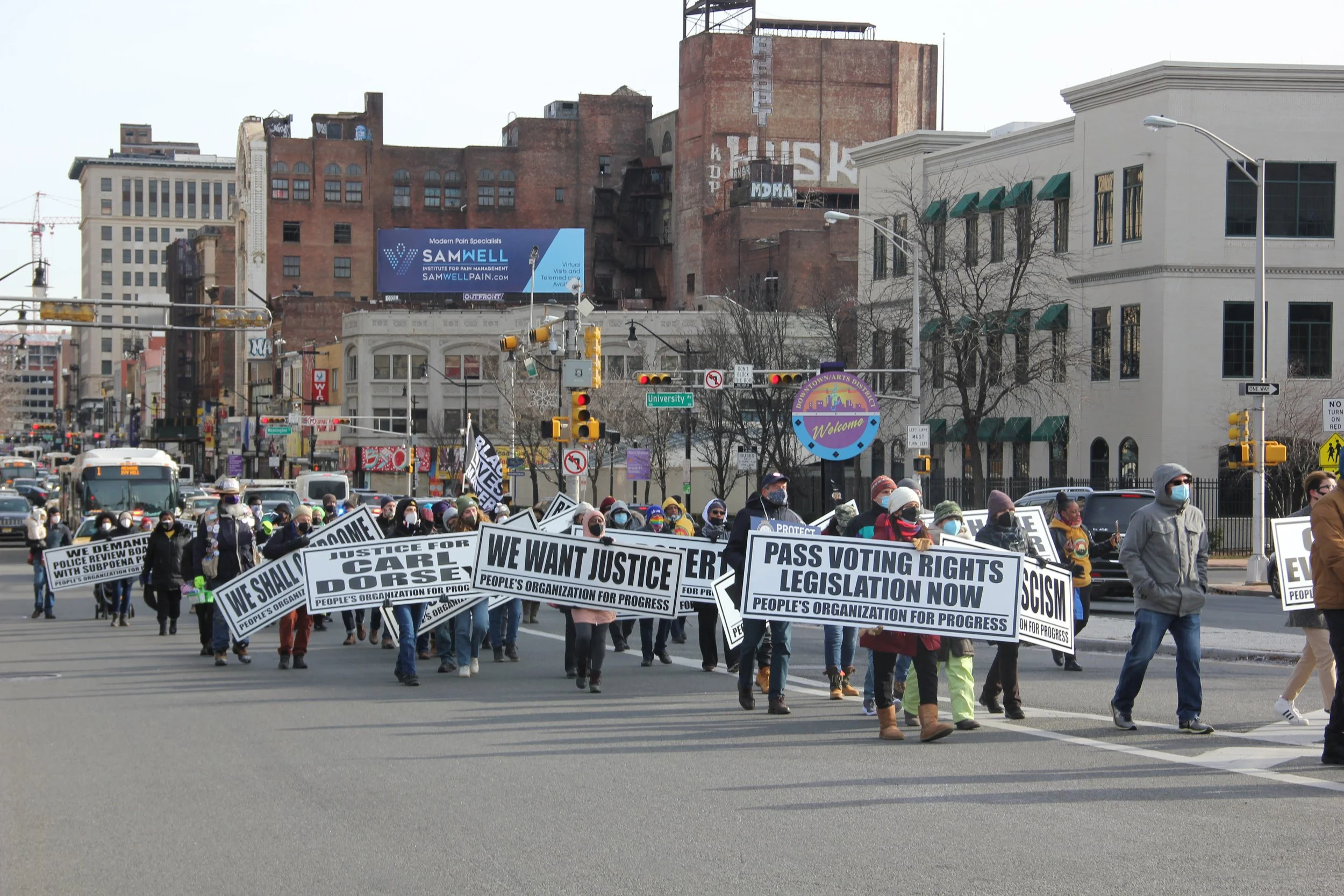
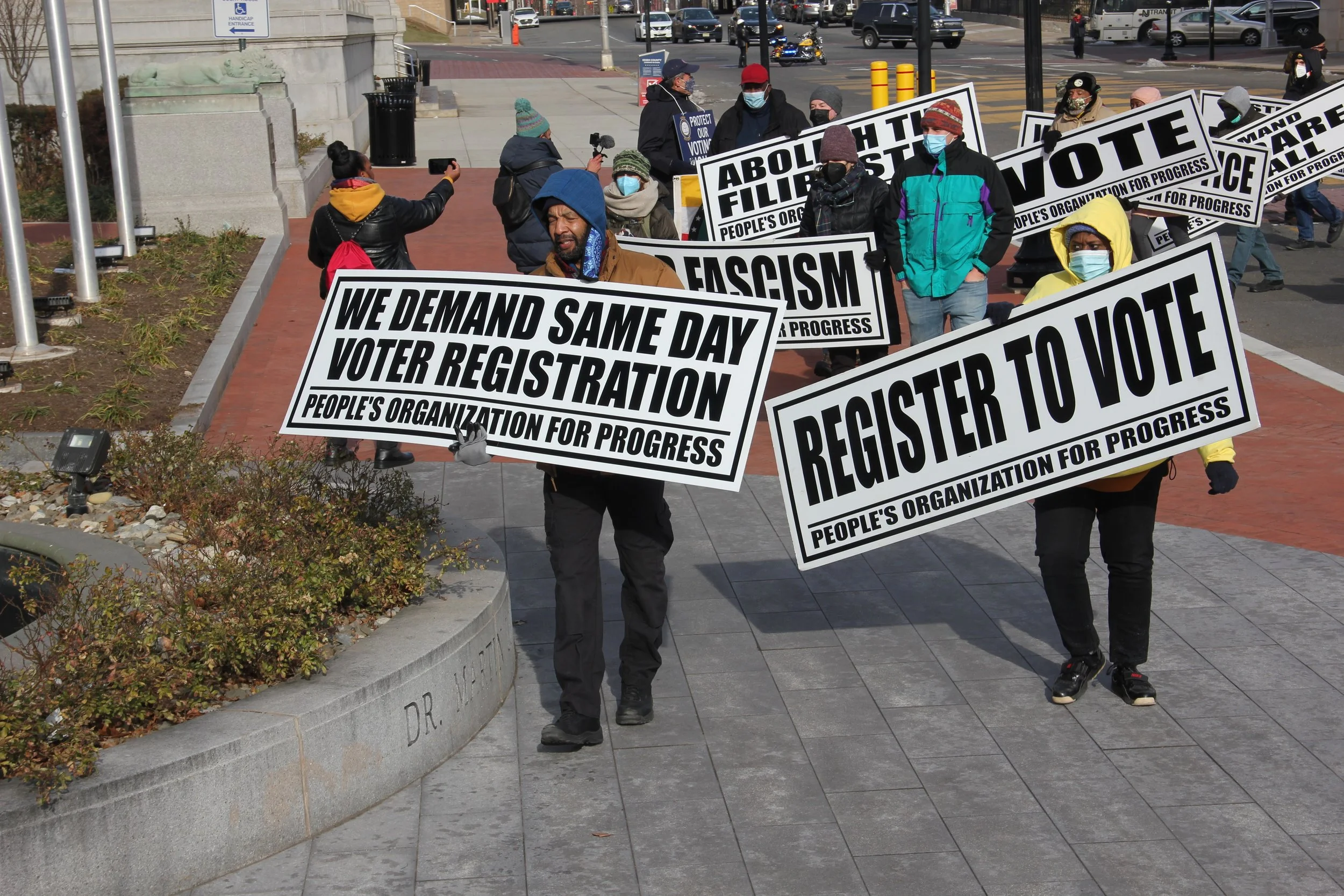
For Linda Carter, retired associate professor of Government at Essex County College, she called on everyone to "live the principles that MLK laid down". She expressed the importance of everyone “showing up.”
"All of us have a responsibility to be active citizens," she said. "Politics impacts us in every way, from the water you drink to the foods you eat to the lotion you put on your baby, so you need to understand what they're doing, what the process is, how the system works in order for you to understand what your power is."
As for Logan, a first-time march attendee, braving the chilly temperature was of no concern because as he said, democracy is under attack and action must be taken now. Together with a childhood friend, they participated, as they said, "for good trouble because no justice, no peace.”
“We're at a terrible infliction point in this country right now and if we do not fight and continue to fight together for justice, for voting rights, [and] these institutions of our systems that are completely under attack, people are going to lose their voice, people are going to lose their opportunities to make change," Logan said.
On August 6, 1965, the Voting Rights Act became law and made illegal, restrictions and barriers to voting that targeted Black voters; it has been under attack since then. In June 2013, the Supreme Court decided in the Shelby County V. Holder case that section 5 and 4b of that bill was unconstitutional. Section 5 “prohibited eligible districts from enacting changes to their election laws and procedures without gaining official authorization” whilst section 4b defined those eligible districts “as ones that had a voting test in place as of November 1, 1964, and less than 50% turnout for the 1964 presidential election.” Since then, “more than half the states in the U.S have laws on the books restricting voting rights,” says Ari Berman, senior reporter at Mother Jones.
In a video posted on Mother Jones’ Youtube channel, Berman went into detail as to how states have made mail in voting and early voting more difficult. The video underscores states such as Texas for enacting “one of the countries strictest ID laws” and North Carolina, for “cutting early voting and polling hours.” He also discusses purging: the practice of removing names from voting rolls, which “increased 40% in states with a history of voting discrimination.”
One of the speakers, NAACP-Newark President, Deborah Smith-Gregory called on those in attendance to continue Dr. Rev. Martin Luther King’s campaign for fair voting rights by calling New Jersey’s elected officials at 202-204-3121 to demand the passage of the John R. Lewis Act.
“The democracy of this country is at a crossroads based on greed and self-interest,” Smith-Gregory said. “We must vote in the November mid-elections everywhere to change the tide or else we will all perish.”
A marcher holds one of many signs carried on the ‘MLK march for voting rights, Jan. 15, 2022.’ (Josie Gonsalves for Public Square Amplified )
The current Voting Rights Bill before Congress, entitled “Freedom to Vote: John R. Lewis Act”, was proposed in the House on Jan. 13, 2022. If passed, the bill would expand early and absentee voting, make election day a holiday, make it easier for people to comply with state voter ID laws, expand and reauthorize a grant program to assure voting access for individuals with disabilities, ensure equitable and efficient operation of polling places, prohibit restrictions on donations of food and beverages at polling stations, and restore incarcerated people’s right to vote after they finish their sentences.
However, this bill cannot pass successfully through Congress unless one of two things occur: Some Senate Republicans join Democrats in voting yes (for a total of 60 votes), or the Democratic Majority reform the Senate Filibuster rule.
The filibuster is a maneuver designed to prolong debate and delay or prevent a vote on a bill. On Jan. 19, Democrats held a vote to reform the filibuster rule and proposed a 51-majority vote (as opposed to 60 members voting yes for a bill to pass) but this was met failure. Fifty two lawmakers, including Democratic Sens. Joe Manchin and Krysten Sinema opposed changing the filibuster rule.

